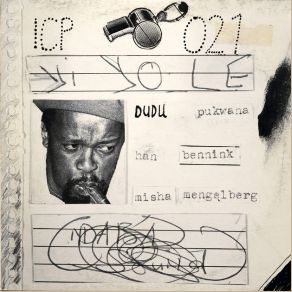Yi Yole
Download links and information about Yi Yole by Misha Mengelberg, Han Bennink, Dude Pukwana. This album was released in 1979 and it belongs to Jazz, Avant Garde Jazz genres. It contains 3 tracks with total duration of 36:58 minutes.

|
|
|---|---|
| Artist: | Misha Mengelberg, Han Bennink, Dude Pukwana |
| Release date: | 1979 |
| Genre: | Jazz, Avant Garde Jazz |
| Tracks: | 3 |
| Duration: | 36:58 |
| Buy it NOW at: | |
| Buy on iTunes $10.99 | |
Tracks
[Edit]| No. | Title | Length |
|---|---|---|
| 1. | Yi Yole (featuring Dudu Pukwana) | 8:41 |
| 2. | The King of Weasle Is Called Easle (featuring Dudu Pukwana) | 10:21 |
| 3. | Silopobock (featuring Dudu Pukwana) | 17:56 |
Details
[Edit]Fans of fiery jazz alto saxophone playing inevitably find their way to Dudu Pukwana, whose career was too short and apparently rampant with chaos. Inevitable reactions are a sense of wonder at how much action he packs into his solos, as well as regret that he didn't record more on his own, although his work as a member of several tremendous bands such as the Brotherhood of Breath is fairly well documented. This recording, too, is essentially a collaboration, and is a bit disappointing. The recording is enjoyable as low-tech, but doesn't bring out the intensity of the quieter sections, nor does it do justice to the sound of Pukwana roaring on alto. If his sound is often described as unbelievably juicy, in this case the juice has spilled all over the speaker cone, or perhaps actually spilled all over the microphone in the bar.
Followers of Han Bennink can speculate on how different this session might have been if recorded a decade or so later, when Bennink had dropped playing anything other than percussion instruments on-stage. Of course there would be no way of ever knowing, because Pukwana died in 1990. Bennink's adventurism here on clarinet, viola, and trombone lends a kind of slapstick chamber music quality to the proceedings, and his longtime partner Mengelberg knows just what to do with it, or in some long stretches, what not to do. This is all a bit surrealistic for Pukwana, who although hardly a mainstream player was not really that adept at the type of free improvisation his collaborators here are into. At the same time, many fans of free jazz are interested in odd collaborations in which different sorts of stylists are thrown together. Although hardly the best production, this is a good example of that kind of musical event featuring three of the finest players on the scene. The title credited to Bennink seems completely improvised, the publishing probably reported as it was to provide an even financial split.